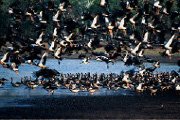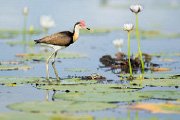Wandering whistling duck
The wandering whistling duck draws its name from its loud whistling call and the noise its wings make during flight.
You might hear it as it flies home to roost after sunset.
It is more aquatic than its close relative, the plumed whistling duck.
What it looks like
The wandering whistling duck is a large bird with rich red-brown plumage. It has a dark stripe on the crown of its head, nape and back of neck.
Where to see it
These ducks live around deep vegetated billabongs, swamps and flooded plains. They prefer deeper waters where aquatic plants and insects are plentiful.
From June to October, look for these birds on the Kungarre walk and Mamukala wetlands Walk, at Anbangbang Billabong and around waterways in the Yellow Water region.
Culture
Djirrbiyuk is an Aboriginal outstation in Kakadu National Park named after the nearby sacred site for the wandering whistle duck. The full name of this place is Djirrbiyuk Kakukdjabdjabdi, which means ‘whistle ducks are standing up everywhere’.
Scientific name
Dendrocygna arcuata
Take the first step
A journey of 1000 miles begins with a single click.
Enter your email to get free trip planning advice from Kakadu rangers.





